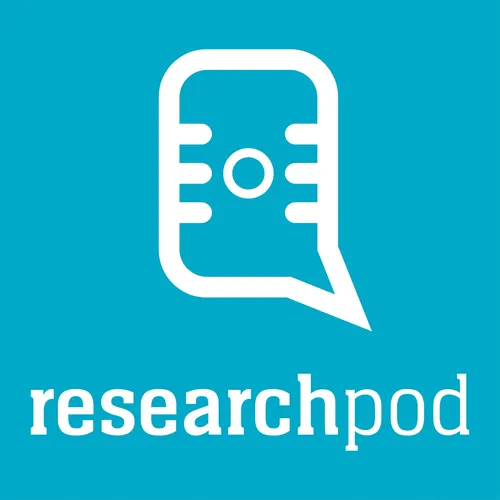
ResearchPod
ResearchPod science podcasts connect the research community to a global audience of peers and the public, raising visibility and impact. www.researchpod.org. All content is shared under the Creative Commons CCBY-NC-ND 4.0 licence. For further information, email [email protected]
- Update frequency
- every 3 days
- Average duration
- 18 minutes
- Episodes
- 486
- Years Active
- 2019 - 2025

Equity and equal opportunities in US education
Equal access to education was an essential facet of the civil rights movement of the 1960s, and has since come to be enshrined in law internationally. However, that is not the whole story of equality…

Cod liver oil analysis for anti oxidant potential
Cod liver has long reputation of health benefits, but manufacturers of fermented cod liver oils claim that their product contains more antioxidants, meaning the fatty acids like omega-3 keep better o…

Tracing the history of East African artefacts in the Smithsonian
William Louis Abbott, a medical doctor sent to East Africa to gather artefacts for the Smithsonian in 1887, collected hundreds of pieces of art, craft and culture from across the region. Professor Am…

Stem cells could offer hope for muscular dystrophy
Researchers are investigating several novel approaches, including gene and stem cell therapy, to meet the challenges of diseases like muscular dystrophy. Recently, Dr Yoshitsugu Aoki of the National …

Psychological support and counselling for couples
Chris Vincent and colleagues have developed a specialist interest in the impacts of serious illness on couples and family life.
This gap between available services and their demand is especially impo…

Mitochondria mutations underlying cancer
Mutations that affect the mitochondrial DNA may play a key role in cancers. However, the exact mutations that are involved in cancer are still unknown. Dr Fatimata Mbaye and collaborators, from the U…

Your DNA, Your Say
Our DNA holds our deepest cellular secrets, from markers of our health the keys to our family tree. But if that information is stored in online databases, it can end up traveling further than we coul…

New standards for plastic analysis to prevent pollution
Plastic pollution is an environmental catastrophe in progress. 32% of the plastic we use escapes into the environment, and only 9% currently gets recycled.
British company Polymateria have developed …

Innovation and evolution in business strategy
Darwins theory of evolution underpins much of our current understanding of biology, and its concepts have even come to be applied in other disciplines. Ideas like ’Survival of the fittest’ and ‘mutat…

Wellbeing and beliefs among prisoners
Do prisoners with religious beliefs and behaviours experience their incarceration differently? How does their emotional state affect the likelihood of rehabilitation, or repeat offences? Professors S…

How do zebra finches learn to talk?
How exactly do birds ‘talk’ to one another? And might research into how birds listen to birdsong help us understand communication both in humans and birds? Dr Robert Dooling and his team, based at th…

Free Electron Lasers: The biggest and brightest
A millisecond may seem a short time to you, but for molecules, this may be longer than their entire lifetime. Dr Sergio Carbajo and his team at the SLAC National Accelerator Laboratory capture thes…

Capturing three-dimensional cell structure with X-ray tomography
Optical microscopes, with the help of cell-staining to colour cells, can help us peer into the invisible world of cells. However, they only show us a 2D image of a very thin slice of tissue. But how …

Reducing harmful emissions from cows using genetics
Dairy farming can have negative effects on the environment, polluting waterways with an excess of nitrogen that can have long-term impacts. Past work has addressed this problem by looking at ways to …

Trauma-informed care and youth resilience
Dr Christine Wekerle discusses the MAP study on trauma resilience among youth, well-venture interventions, and the JoyPop mobile platform for well-being and recovery support among survivors.
You can f…

Movember, Coronavirus and mens mental health
This year has proven a unique challenge to the mental health and resilience of many across the globe. Dr Christine Wekerle discusses how, for young people with mental health concerns, the challenges …

Nicotine and disease in review
While nicotine is perhaps the most notorious component of tobacco smoke, what can be said of its biological and chemical activity by itself? A recent paper by Dr Leonie Price and Dr Javier Martinez h…

Canadian National Sport Organizations’ Governance, Branding and Social Media
How can non-profit National Sport Organizations in Canada create effective brands, especially on social media, from which they can co-create value with stakeholders such as athletes, fans, sponsors, …

War, colonialism and medicine
Leo van Bergen is a medical historian who has spent his career chronicling the history of health and humanitarianism in warfare. In 2009 Van Bergen was awarded the J.A. Verdoorn-prize for his work, a…

Dementia, degeneration, and gold nanoparticles
Prof Kazushige Yokoyama, State University of New York Geneseo College, investigates how peptide interactions lead to fibrillogenesis, the process in the brain responsible for some symptoms of Alzhei…